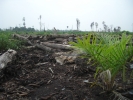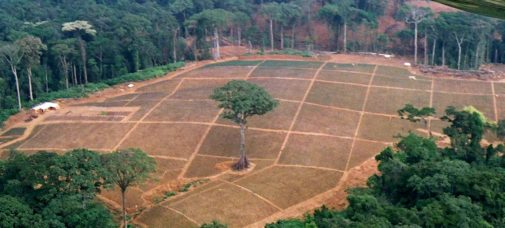- Details
 Moorim Paper, Korea's second-largest pulp and paper manufacturer, claims on its website that it "thinks of the environment" by not using environmental sources. But according to a report by environmental activists in Korea and Indonesia that was released March 15, the company based in Seoul's Gangnam District has been lying. Using its subsidiary firm PT Plasma Nutfah Marind Papua (PT PNMP) in Indonesia, Moorim has been clearing more than 6,000 hectares of pristine forests in the remote province of Papua between 2015 and 2021 to produce wood chips for papermaking without having performed a proper environmental impact analysis prior to clearing the land.
Moorim Paper, Korea's second-largest pulp and paper manufacturer, claims on its website that it "thinks of the environment" by not using environmental sources. But according to a report by environmental activists in Korea and Indonesia that was released March 15, the company based in Seoul's Gangnam District has been lying. Using its subsidiary firm PT Plasma Nutfah Marind Papua (PT PNMP) in Indonesia, Moorim has been clearing more than 6,000 hectares of pristine forests in the remote province of Papua between 2015 and 2021 to produce wood chips for papermaking without having performed a proper environmental impact analysis prior to clearing the land.
- Details
 For the pulp and paper industry, it is the take-over of the decade. Domtar shareholders decided today to sell their shares to Paper Excellence and delivered the major North American uncoated freesheet paper producer (with 21 manufacturing facilities around the world, 6,400 employees, and customers in 50 countries) to one of the most controversial paper companies of the world, the notorious Indonesian Asia Pulp & Paper (APP).
For the pulp and paper industry, it is the take-over of the decade. Domtar shareholders decided today to sell their shares to Paper Excellence and delivered the major North American uncoated freesheet paper producer (with 21 manufacturing facilities around the world, 6,400 employees, and customers in 50 countries) to one of the most controversial paper companies of the world, the notorious Indonesian Asia Pulp & Paper (APP).
- Details
 Today a coalition of civil society organisations published a report about deforestation and peatlands degradation on the rainforest-rich island of Borneo in Southeast Asia. Based on analysis using satellite imagery, the report documents significant deforestation, including clearance of forests on peatlands, in the concession area of PT Adindo Hutani Lestari (Adindo), one of global pulp and paper producer APRIL Group’s largest suppliers of wood to its pulp mill in Indonesia.
Today a coalition of civil society organisations published a report about deforestation and peatlands degradation on the rainforest-rich island of Borneo in Southeast Asia. Based on analysis using satellite imagery, the report documents significant deforestation, including clearance of forests on peatlands, in the concession area of PT Adindo Hutani Lestari (Adindo), one of global pulp and paper producer APRIL Group’s largest suppliers of wood to its pulp mill in Indonesia.
- Details
 In North Africa, illegal man-made fires are on the rise, driven in large part by a growing demand for charcoal, which is produced by burning wood in underground pits. In the past, local people collected dead wood on a small scale, and larger operations were regulated by the government (3). However, as the demand for charcoal and the price for which it sells have increased, illegal efforts to produce it have multiplied (4). North African countries must address the resulting fires to protect forest ecosystems, which play an important role in the welfare of both urban and rural people and harbor unique and sensitive biodiversity.
In North Africa, illegal man-made fires are on the rise, driven in large part by a growing demand for charcoal, which is produced by burning wood in underground pits. In the past, local people collected dead wood on a small scale, and larger operations were regulated by the government (3). However, as the demand for charcoal and the price for which it sells have increased, illegal efforts to produce it have multiplied (4). North African countries must address the resulting fires to protect forest ecosystems, which play an important role in the welfare of both urban and rural people and harbor unique and sensitive biodiversity.
- Details
 Tropical rainforests shrank by 6,500 square kilometers in March. Criminal groups are taking advantage of the pandemic and the unemployed are getting desperate, the WWF said. As the COVID-19 virus was spreading around the world, deforestation in the world's rainforests rose at an alarming rate, the German arm of the World Wildlife Fund (WWF) said in a o study published last week.
Tropical rainforests shrank by 6,500 square kilometers in March. Criminal groups are taking advantage of the pandemic and the unemployed are getting desperate, the WWF said. As the COVID-19 virus was spreading around the world, deforestation in the world's rainforests rose at an alarming rate, the German arm of the World Wildlife Fund (WWF) said in a o study published last week.



